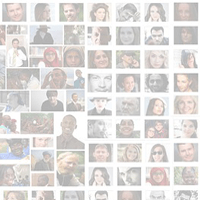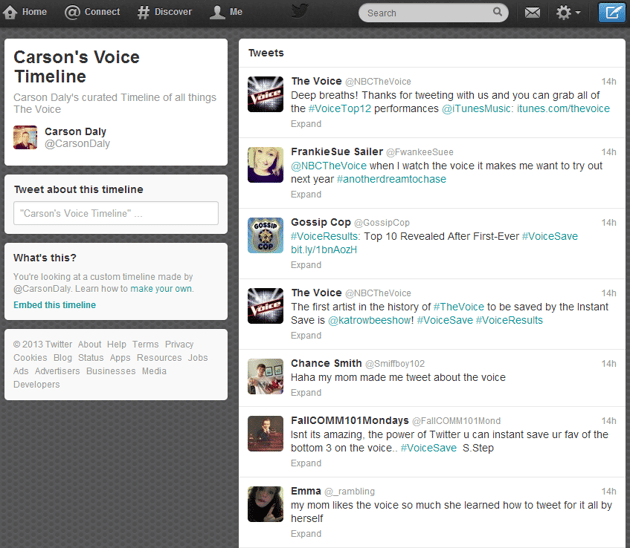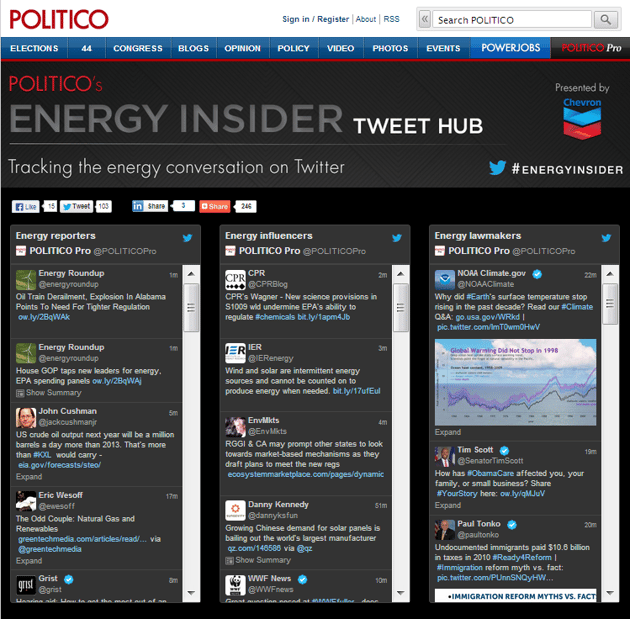5 Brand Uses For Custom Timelines

Fresh off its big IPO filing, Twitter has introduced a new feature that is sure to shake up the social landscape - especially when it comes to events.
The feature, dubbed "Custom Timelines", aims to give users more control over how tweets are organized and delivered. That said, the feature should prove particular useful in the realm of big events, as Twitter is already known for being a hub for breaking news. For example, during the next big election, CNN could leverage the feature to showcase tweets from a variety of voters. That, however, is just one of the many potential uses this new feature offers. Learn more about Custom Timelines and its possible benefits for brands below:
What is a Custom Timeline?
Custom Timelines are essentially a new, user-created timeline. Users choose everything from the timeline's name to the tweets that appear in it. According to the Twitter Development Blog, "This means that when the conversation around an event or topic takes off on Twitter, you have the opportunity to create a timeline that surfaces what you believe to be the most noteworthy, relevant Tweets."
Each Custom Timeline is public and has its own page on Twitter.com, which makes it easy to share for others to follow. More importantly, these timelines are part of the Twitter for websites toolkit, meaning they can be embedded into websites, which provides many opportunities for brands.
Custom Timelines can be created, added to and shared from TweetDeck. However, it is important to note that this new feature is still being rolling out, and should arrive to all TweetDeck users sometime over the next several days. But the news doesn't stop there, because Twitter has also launched Custom Timelines API beta, which will open up opportunities like programming custom timelines based on rules or building tools that help people create their own timelines. The API is currently only available to a small group of select partners, but developers interested in obtaining acces can fill out this form.
How is it Different than Twitter Lists?
At first glance Custom Timelines appear similar to Twitter Lists, however, the features have some clear differences. Let's start by taking a look at the functionality of Twitter Lists, which seems to be an under-utilized feature in the first place. That said, the List feature enables users to curate group of Twitter users that can be subscribed to. When viewed, a List will display its members, as well as a stream of those members' tweets.
There are a few glaring differences between the List and custom timelines functions, most notable is the fact that Lists show all tweets from every member - meaning that users don't have as much control over their Lists as they do their Custom Timelines. For example, if a gym created a List of its trainers, every tweet (including non-relevant and personal tweets) would be on display to customers. Conversely, if the gym leveraged Custom Timelines, it could either hand pick the featured tweets or create rules via the feature's API (such as including tweets from specific people only when they contain a keyword or certain hashtag) to filter the tweets that are showcased.
Will Brands Benefit?
Twitter provides some examples of business-based custom timelines in its announcement, but with the newness of this feature and the fact that it and the API are not widely available yet, it is safe to say we are only just scratching the surface of the potential uses for Custom Timelines. Regardless, take a look at some examples below as inspiration for your own brand:
1. Q&A
One of Twitter's examples comes from The Guardian, which is hosting a Q&A and will curate the questions from readers and then journalists will provide answers into a custom timeline. This enables brands to showcase a Q&A event after it has been taken place, so consumers don't have to sift through hashtags to keep up with a past conversation.
2. Live Events
Conversely, Carson Daly, who is the host of the TV show The Voice, leveraged Custom Timelines during last night's live competition. The result is essentially a group of top tweets relevant to the show, making it easy for viewers to monitor conversations about the event.
3. Feature Experts
Twitter also sheds light on POLITICO's use of the new feature. The media company, which has early access to the Custom Timeline API, decided to use the technology to feature the most influential handles in energy policy inside its "Energy Insider Tweet Hub". The company uses the technology to filter tweets that focus on conversations relevant to energy policy.
4. Customer Reviews
Outside of the examples Twitter's announcement offered, there are a couple of other uses for this feature that come to mind. Brands, particularly ecommerce merchants, could use Custom Timelines to showcase positive customer reviews about products and services on their websites.
5. FAQ
Another way brands could leverage this feature is by curating a list of frequently asked questions. This could be used as a supplementary link from a FAQ page, or could even replace a traditional FAQ page altogether.
As previously stated, these uses are likely just scratching the surface of the benefits Custom Timelines could provide brands in the future. What are your ideas for this new feature? Share them in the Comment Section below.

Subscribe to Our Newsletter!
Latest in Social Media











